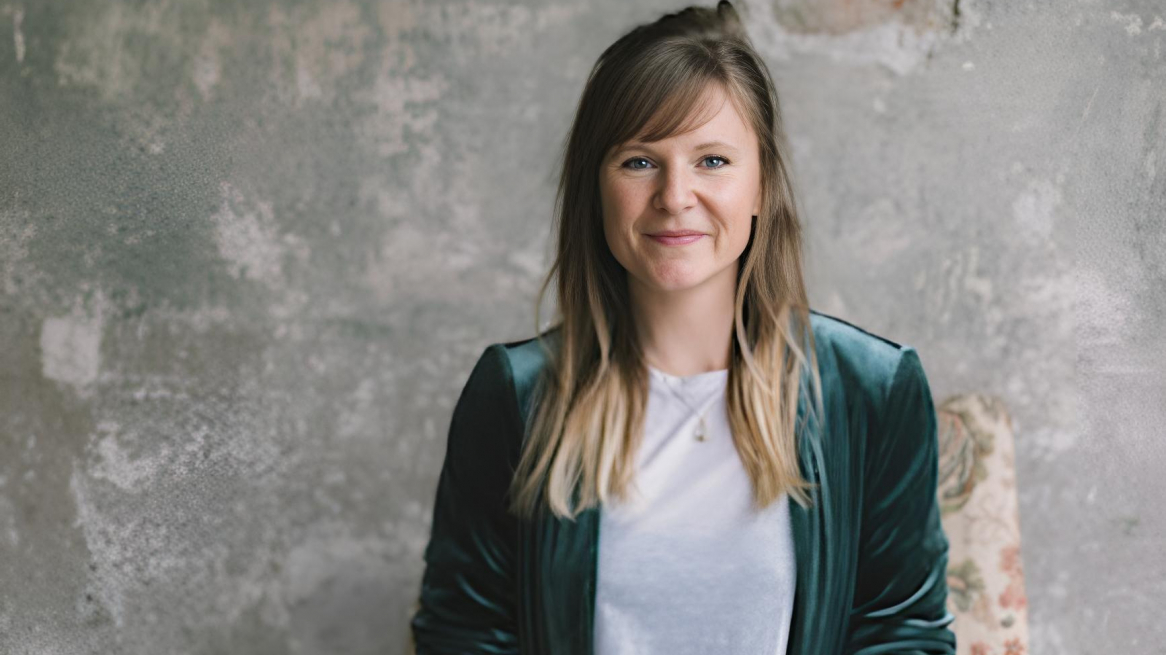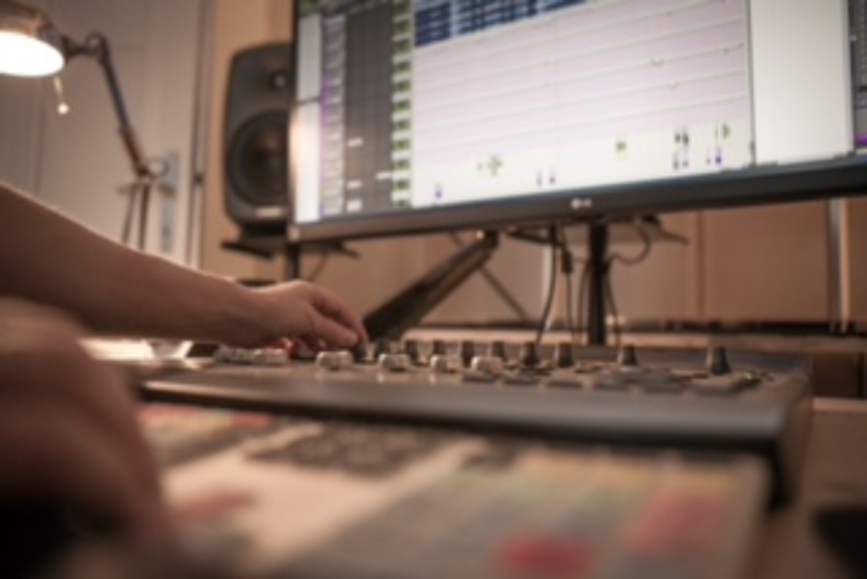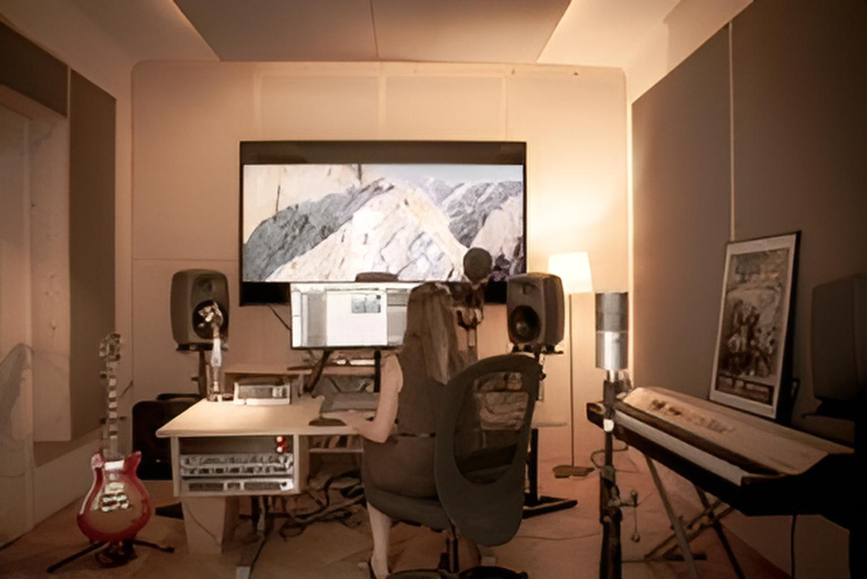
The first time I met Isobel Cope, I was halfway through presenting my radio show Sensations in the Dark (on Freirad 9 to 11pm every final Friday of the month...yes, I had to get a quick plug in!) The reason she could only join us for the second half of the show was that she'd just hotfooted it over to the Freirad studio from the city library, where she'd had a gig that night. This gives you some idea as to Isobel's character (Character, incidentally, being the name of one of the band's she was playing in at the time) and just how steeped in music she is.
We've since become friends - Izzy is involved in all sorts of interesting musical endeavours - but I'd never spoken to her much about her day job as a sound engineer, or how she met hollywood superstar Kate Winslet. So, I thought it would be a good idea to sit down for a chat about it all and the good people at Innsbruck Tourism agreed. I recorded this interview on the roof terrace of Die Bäckerei, a fantastic venue close to the centre of the city.
What have you been working on lately?
'I've done a few films in the past year. One really cool one called Woolf Women about these five wild women who do downhill skateboarding...nuts!... absolutely nuts stuff. With these little kneepads and helmets they go 130kmph down these mountain roads, often without the roads being blocked off. So there could be cars coming. It's an 80 minute documentary about a trip they did, to do this epic skate. It's very emotional, very action-packed. I think I really enjoyed it because it's a female extreme sports film and I've done a lot of male extreme sports films. When I was watching it, I just thought, this is more nuts than the male freeriding stuff I've done! Everything's hard...I mean, I know snow's hard if you fall on it but it isn't tarmac is it? You can't argue with tarmac!'
What specific challenges does a film like that present for you?
'It's challenging because they filmed it on many different types of equipment, including phones, which meant the audio was.... difficult. From a mixing point of view it was quite a challenge to get the best out of the audio whilst also filling it with enough atmosphere for it to sound cinematic. And also, do it on a really tight timeline. It was really intense.'
What else have you been working on lately?
'Two short films. One is a fictional short film about Uheber. That's an old, old healing technique that they do in Zillertal (valley in Tirol) It's a bit magic-y.... they can do things like lay their hands on somebody who's bleeding and chant and it stops the bleeding. It was around that theme... but a bit more 'horror', so that was a nice chance for some sound design..
(At this point of the interview, an aeroplane flies overhead...)
Is that going to be a problem?
No, no, it's fine. You're always listening out for stuff like that!
I can mix that out! Anyway, the other short film was a short half-fictional, half-factual film about people in northern Russia, herding reindeer. It's very sad, their way of life is disappearing because of global warming and there's nothing they can do about it.
And I had a couple of advertise-y things to mix, which is also cool. One where somebody disappears into a fridge to get some milk - it's a milk advert - and the other one is for the cross-country skiing at Seefeld'.
So you'll have to add some snow effect sounds?
'I think I'll have to do almost all the sound. When they're filming, you get this panning from right to left - quiet to louder to quieter - when they are going past it will work for that shot but if they're filming from further away and not picking up any sound I have to remake the sound. I can't re-use other bits, it won't match. But I've just found a really nice cross-country ski library so I'll be dragging it all in, lining it all up...'
What's the process by which you get this work?
'I would say I'm quite a heavy networker. When I moved here I had a job so I didn't have to do much. I was working with a film composer'.
How did that go, working remotely?
'We met in London, and we were working in the same room all the time. Then he moved to France and I stayed in London. So when I said I wanted to move to Austria, he was like 'yeah...do whatever you like', because we weren't in the same place anyway. So I moved here in 2015 and we did two years of remote working.
As to how it was possible to do that, I wasn't doing any of the final mixing. So he would write the music to a film - we did a lot of cartoons, kids TV... so he would write the music, he then sends it to me, I do a little bit of mixing and then I put it up against the video and then I send that to the client so they can go through it - 'I like that bit, didn't like that bit' - they would send the notes to me. I would see if I could make the changes and at the same time he would have to re-write and I would have to re-edit stuff. Then he would send me the next version and I'd put it to the video, send it to the client. That would work quite well because all I needed was good speakers and a good internet connection. I was also doing some network-y stuff for him and a lot of administration'.
Which cartoons did you do?
'Tree Fu Tom, Sonic Boom, 1001 nights - that one's big in Canada. He's Canadian and a great networker so we'd go to these conferences in Canada and the States. Eventually he moved back to Canada from France. So we were in completely different time zones, which worked really well. His working day would finish, we'd have a short crossover and then mine would begin. So when he'd wake up the work would be done!
But at some point he had less work and was concentrating on other things so my hours got reduced. So then I started networking a bit more and just happened to find, through friends, one of the best, most active production companies in Innsbruck; White Room Productions. It worked out so well because they just happened to be looking for somebody to do all their sound stuff. So I got loads of great projects from them and if I worked on a film of theirs I would go the festivals (where it was showing) and if I noticed while watching other films that they hadn't been mixed I would contact those people afterwards. 'Who did your sound? Are you in need of sound?'.
So the networking you did with the film composer served you well when you branched out on your own?
'Yeah, in the end I'm glad that that job came to an end, even though it was well paid because there was a lot of sitting around. There's a really great film network in Innsbruck. It's small but it's great. Mostly mountain related - sports films, but also advertising, tourism in Tirol, some good short fiction. And also, three years ago I did my first nature documentary with a guy from here called Patrick Centurioni. That was amazing, a real eye-opener. So just to explain, when I stopped working with the composer, I stopped doing film music and started doing post-production sound and that's basically all I've been doing since. Sound effects, mixing, all the polishing. So when I did this nature documentary I was basically given a blank film because animals are filmed from so far away there's no way you get the sound of a squirrel scratching a nut. So I basically had to do everything myself... the wind, the rustling of the leaves, whatever the background might be. So I layer that in first. Then I get myself a board and think, 'right, what surfaces do I need?' So for the last film I got salt - which is snow, then some earth, some twigs and leaves...'
So you literally have a board in front of you with salt for snow and so on?!
'Yeah. It's split in quarters. It's called a foley floor, it's very common. Foley is another word for sound effects you make with your hands. So when a deer walks past, I'm there using my fists. You can't find that stuff in a library. It's too specific. It's quicker and easier to become the animal yourself! It was the first time I'd done it and I absolutely loved it. I'm now working more closely with Patrick and his production company. That really fascinates me. It's fun but very, very precise work, very exhausting. I have to take a lot of breaks'.
Where do you do this work?
'When I stopped working with the composer and started doing more soundwork I had to have a studio. So then I started doing heavy networking around the other engineers and I found a really cool guy called Peter Rösner who had a studio. He wasn't there a lot of the time because he goes on set for months at a time, to do recording. Sharing works really well for us because I don't go on film sets. It's perfect. Financing a studio all by yourself is a lot but we can share all the costs so it's more feasible.
Tell us about how you started in sound engineering!
'I went straight from university in Leeds to working in a studio in London, as a runner. Which is how everyone starts. Making tea, fetching fruit, slowly getting to know the engineers, sitting in, watching and learning. Eventually I moved up to half-runner/half-assistant. It takes time. You sit, you listen, you learn. I found it tough but eventually I'd be at the computer, using pro tools. The engineers would be at the desk. That's when you're really 'in it'.
What made you want to do this work?
'Through music. My whole family is musical and I always did all the music stuff I could. I did Music technology GSCE (14-16 years old in England and Wales), quite new at the time. And Music tech A level (post school, pre university). There were only three of us doing Music tech A level and our school had an amazing music studio so I spent so much time in there'.
I think we should finish up with a bit of name-dropping. Tell us about working with Kate Winslet!
'Haha! Yeah, that's a good one! That's one of the advantages of working in a big post-production house in London - you get that level of actor coming in. It was a very tragic documentary film about a woman in a warzone. They made this film about her and Kate Winslet volunteered to do the English voice because it was all in a different language. So she came in dub this woman in English. I was the assistant ADR engineer. ADR is additional dialogue recording - it happens after a film has been shot and actors redo bits of dialogue. So let's say it's Pride and Prejudice and an aeroplane flies overhead just as somebody is saying something. But it's a perfect take. Obviously, they didn't have aeroplanes in Jane Austen's time! So the actor comes in, re-records the line then you put that in. It's the same with any film that gets dubbed into German - weeks and weeks, months and months of ADR.
So Kate Winslet came in and she was dubbing the English and somehow getting it to match. Afterwards we were saying to her 'that's incredible...how on earth did you do it?' Then she told the story about the last hour of the film Titanic when they're all in water, and she was saying they were in a big pool filming. So they couldn't use any of the audio. There were tons of camera crew in there, all splashing around, the acoustics of the pool.. so they basically couldn't use any of the dialogue. They had to cut it all, nothing from those scenes is original dialogue, it's all dubbed. So she said it was weeks and months of doing these scenes, re-recording everything, and since then (Winslet was 21 years old at the time) she's been nailing ADR, absolutely no problem! In Titanic there was a lot of shivering, she's supposed to be freezing cold and she had to reproduce that in a warm studio in London. Maybe they had to ramp up the air-conditioning! It was really cool meeting her. It's a highlight working with people who are at the top of their game'.
Thanks so much, I'll let you get off to your warm studio now.
Next live dates
Isobel is performing at the monthly 'Jammin Tuesday' session at Treibhaus on February 13th 2024. Entry is free/donation.
And she hosts and plays at Die Bäckerei's Singalong Session on Thursday 18th April 2024: Absolutely no musical experience necessary - all you need is your voice, everyone is welcome (lyrics and chords are projected on the wall).
Header photograph by Maria Kirchner
For more information, visit Isobel Cope's website
Rate this article
Show me the location on the map
Welsh-born father of two boys. Innsbruck resident since 2009.
Similar articles
The mountains around Innsbruck are not only known for their breathtaking beauty, but also for their living…
Beautiful and good: the noble product world Anyone in Tyrol looking for high-quality regional products in attractive…
What do you do when the highest elevation near your home town is only around 150 meters?…
"If the bee disappears from the earth, humans will only have four years to live. No more…








